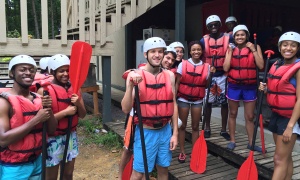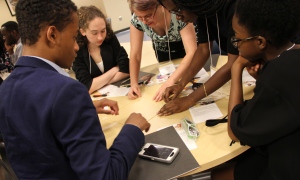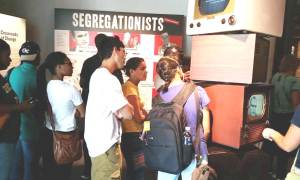Challenge Science
Course Number Equivalent: CHEM 1310 and 1211k
Course Name: Chemistry I
Description: Chem 1310: Fundamental laws and theories of chemical reactions. Topics include atomic structure; bonding theory; stoichiometry; properties of solids, liquids and gases; chemical thermodynamics; electrochemistry; and kinetics.
Chem 1211k: Chemistry for majors requiring a minimum of three semesters of chemistry (BIOL, BCHM, CHBE, CHEM, EAS, MSE, etc.).
**There will be an in-class lab once a week.**
Computer Science
Course Number Equivalent: CS 1371
Course Name: Computing for Engineers
Description: Foundations of computing with an introduction to design and analysis of algorithms and an introduction to design and construction of programs for engineering problem-solving.
Course Number Equivalent: CS 1321
Course Name: Intro to Computing
Description: Foundations of computing with an emphasis on the design, construction, and analysis of algorithms. Laboratory-based instruction to computers and software tools.
Communications & Development
Course Name: GT0900
Description: This course is designed to enhance students’ ability to critically analyze and effectively communicate through various communication forms, related to higher education. Students will address topics such as critical analysis of written, oral, visual, electronic, and non-verbal/numeric communication; effective academic presentations; winning resume writing; technical writing; leadership skills; career planning and more.Students will also learn to assess projects and context based on cultural competency and social impact.
Calculus
Course Number Equivalent: MATH 1551 and 1552
Course Name: Calculus I and II
Description: Calculus I: Differential calculus and basic integral calculus including the fundamental theorem of calculus and Taylor’s theorem with remainder.
Calculus II: Concludes the treatment of single variable calculus and begins linear algebra, the linear basis of the multivariable theory.
Challenge Program Director
For more information about Challenge, contact the program director:
Jelani Liddell, M.S.Ed.
Assistant Director, Outreach Initiatives
OMED: Educational Services
jelani.liddell@gatech.edu

Team Building
There is no “I” in T.E.A.M. Some may argue that there is no “WE” either. We have all been in situations in which we have felt both ways about the subject of TEAM. Whichever way you look at it, team building is an essential ingredient in success at Georgia Tech and life in general.
As a student, you will undoubtedly work in groups both in and out of class. Many times your groups will be pre-assigned. Therefore, it is important that you have the necessary interpersonal skills to function in a group environment, especially if the group is unfamiliar. In these groups, you will have to leverage your particular skills and mesh them with the skills of your teammates. During Challenge, you will have several opportunities to function in group projects. OMED’s goal is to place you in unfamiliar groups and situations, so you can discover your personal strengths and weaknesses. Our hope is that students will further develop their strengths and improve their weaknesses.
Team Building Activities
- Whitewater Rafting
- Scavenger Hunts
- Group Presentations

Professional Development
As a Challenge participant, you will be presented with several professional development workshops sponsored by leading corporations and facilitated by outstanding corporate representatives. In the past, students have had one-on-one engagement with BP, Procter & Gamble, 3M, John Deer, Bechtel, and many more.

Personal Development
During the Challenge program, you will have various opportunities to learn more about “SELF." The next four or five years while matriculating at Georgia Tech (six or seven years for some) will be filled with experiences that shape and challenge many ideals and values. Students will change, and these changes will be the result of many things. A significant component of Challenge is personal development.